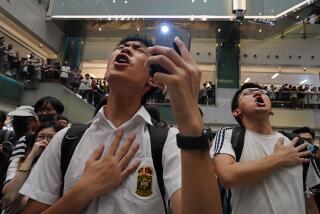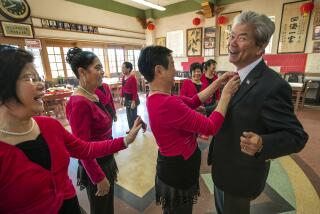Ex-Colony Parties Through First Day of Chinese Rule
- Share via
HONG KONG — This city celebrated its first day in 156 years as part of China on Tuesday with an orgy of political speeches, variety shows, religious observances and wild parties, culminating in a spectacular fireworks display and mass karaoke songfest at Hong Kong Harbor.
Overnight, across the Hong Kong islands and Kowloon Peninsula, the red flag and five-star emblem of the People’s Republic of China replaced the British Union Jack and lion-and-unicorn crests on public buildings. Police officers traded in their Royal Hong Kong Police badges depicting British clipper ships for new ones displaying the city’s skyline.
At the evening reunification gala in the Hong Kong Coliseum, the honored guest was Chinese Foreign Minister Qian Qichen. Chinese officials, who under British rule seldom ventured into the colony, became the most sought-after companions at private parties celebrating the transfer of power. Mandarin, the dialect generally used in Beijing, mixed freely with Cantonese, the one most often spoken in Hong Kong.
Meanwhile, traditional British wood-and-leather watering holes such as Jimmy’s Kitchen in Hong Kong’s Central District had little business the day after the last British governor, Chris Patten, departed the island aboard the royal yacht Britannia. “It was rockin’ here last night. Everyone was drinking hard,” said Jimmy’s Kitchen maitre d’hotel Derek Chung. “I guess today they are sleeping it off.”
The Royal Hong Kong Yacht Club, the only institution in Hong Kong permitted to keep its royal title, staged a two-day party that had begun festively with drunken revelers pulling each other across the dance floor in rickshaws. By the time the party concluded Tuesday, it had taken on the air of a wake: Bitterness and sadness over the end of the colonial era played on the faces of the party-goers.
Meanwhile, thousands of other residents gathered to demand more parties--but they meant political parties. Carrying signs urging an “End to One-Party Rule!” on the mainland, a large group of democracy supporters marched through the rain to government offices to test the political waters.
Although their protest could be considered “subversive” under new laws passed earlier in the day, police merely stopped traffic to help them proceed and made no arrests.
At the Hong Kong stadium, Buddhist monks presided over rites blessing the new era, while in cathedrals and parishes, Roman Catholic priests read a letter of goodwill from Pope John Paul II.
In countless variety shows staged Tuesday, which was a holiday here and throughout China, legions of child dancers and drum-pounding musicians acted out themes depicting Hong Kong’s rise from a lonely outpost to a world economic capital. In one show, a dance depicting the widespread opium addiction during the 19th century featured lifeless forms stretched out on the stage as though dead.
Meanwhile, models in silver rhinestone bras and Lycra miniskirts distributed potent blue “bliss” drinks--composed of curacao, gin and lemon juice--at the territory’s first charity ball marking the new epoch.
“We are celebrating Hong Kong coming into its own,” said Sally Lo, sponsor of the Climax on the Peak cancer benefit attended by several hundred glitterati atop the highest mountain on Hong Kong Island. “We didn’t want to be political with the East-West thing. We just wanted to show the world we are saying yes to the future with the positive message, young and funky.”
*
Jerry Pang, an investment banker who came to the bash in a black Mandarin-style jacket, said the time had come for Hong Kong residents to move on with their lives, work hard to make money and play hard with the proceeds.
“How should I say this,” he said, searching for the right words. “All of the feelings have been expressed. One needs now to be sort of impassive about what has happened.”
Sung Kingsing, 43, was one of the tens of thousands of Hong Kong residents who braved steady rain to line the waterfront Tuesday night for a $12.8-million “Hong Kong 97 Spectacular” featuring fireworks, lasers and 30 electric barges with Chinese cultural themes displayed in colorful light panels on their sides.
Sung carried a transistor radio tuned to a local channel so he could participate in the mass karaoke songfest, part of the extravaganza produced by L.A.’s Don Mischer, who co-produced ceremonies at the 1984 Olympics in Los Angeles and 1996 Games in Atlanta. Microphones were installed along the Hong Kong waterfront so onlookers could join in.
“I’m looking forward to singing ‘Wo Ai Zhong Guo Ren’ [‘I Love the Chinese People,’]” Sung said. The ballad was composed by pop singer and songwriter Andy Lau to celebrate Hong Kong’s repatriation to China. In a video version, Lau sings the tune from the ramparts of the Great Wall of China near Beijing.
Longtime residents said the 10-minute fireworks display, which exploded into brilliant color along a two-mile stretch of the busy harbor that had been closed to all other ship traffic, was one of the most spectacular ever witnessed here.
Quayside viewers got an extra eyeful when one of the 10 fireworks-laden barges caught fire, and firefighting boats were called in to put out the blaze.
Times staff writer Evelyn Iritani contributed to this report.
More to Read
Sign up for Essential California
The most important California stories and recommendations in your inbox every morning.
You may occasionally receive promotional content from the Los Angeles Times.













